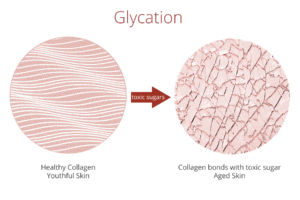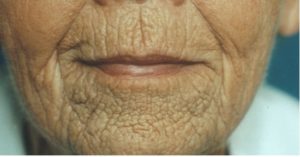February 2021 –
That sweet tooth could also be leading to fine lines, and wrinkles in your skin and causing your premature aging. What is causing this? Well it is called, glycation.
As if we didn’t feel guilty enough grabbing that extra chocolate bar out of our kid’s Valentine’s Day bag…
What is glycation, and why is it important for your skin? Well, glycation is when sugar molecules in the body attack cells bonding with fats and proteins. The proteins lose their shape and excrete exotoxins that disrupt their cellular metabolism. The main protein affected by glycation, collage, which helps make our skin look smooth and plump. Smooth and plump skin, yes please… sign me right up.
What’s causing this, well when we eat, our body is working to break down carbohydrates and turn them into sugars, like glucose and fructose, which are very essential for our cells and energy. Glycation is the non-enzymatic reaction to those sugars, such as glucose, and proteins, lipids or nucleic acids.
So, as a reminder glycation is caused when sugar molecules attach to collagen in the skin.
But what does it look like, just normal wrinkles, fine lines?


Well, not just fine lines, Glycation shows on the skin cross hatched lines and wrinkles, a in criss/cross overlapping pattern, as shown above. Other signs of glycation include discolored skin, weak skin, it will be less supple, and show sagging and loss of radiance.
Besides watching and being moderate of your sugar and sweets intake, be mindful of fried foods, red meat, and white bread also. You can incorporate antioxidants to help protect your cells by neutralizing free radicals that damage the proteins in your body. Some examples include, garlic, cinnamon, turmeric, and green tea. But the best ways to correct glycation is a combination of clinical skin treatments and an at home DMK regiment which will include vitamins A, C, and E to help reverse these signs. My favorite combination from DMK, nite firm and aminodine, a refreshing hydrating spay that reactivates the glucose and normalizes the free radical effect of glycation.
As always, stay away from smoking, and UV damage from the sun, and indoor tanning beds, and only a few chocolate hearts this Valentines Day.



